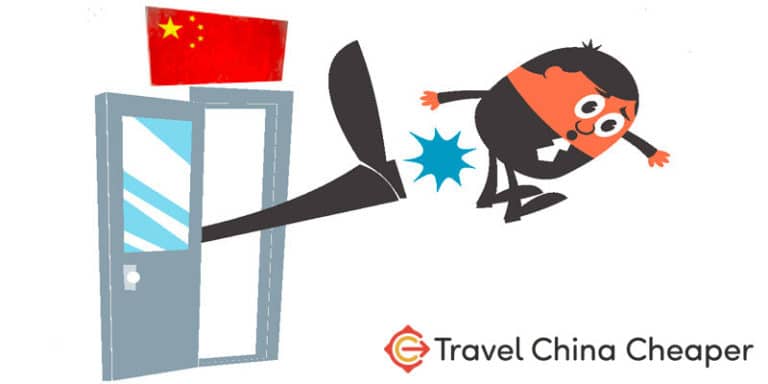Before you sign a rental contract in China, it pays to do your homework. If you’re lucky, your employer will find and rent the apartment for you, but in most cases you’re going to need to know how to negotiate your own rental contract in China. Here are the questions you need to answer before you sign.
We’ve already covered how to find a good apartment in China, but the problem most of the time is that expats in China gloss over the most important part:
The rental contract.
Many an expat have been burned by bad contracts and/or bad landlords in China (that includes me!). I don’t want you to be one of them.
Over the past decade I have lived in numerous apartments, using a number of different Chinese rental contract templates, and I have learned a lot from each experience that I would like to share with you.
Before we dive in, I will say that while many people rely on contracts from their landlords or agents, if you really want to protect yourself I suggest you purchase and download a quality English/Chinese bilingual rental contract. It’s what I use personally and has saved me from a couple major disasters.
If you’d rather do it yourself, here are the 5 questions you need to make sure your rental contract in China covers you:
Each of these is an important question that I’ll explain in detail below.
Who’s Responsible for Broken Appliances?
Let’s say you sign a contract and move into your new apartment in China. Two weeks later, you’re starting your normal day and go to take a shower…only to find that the hot water heater is broken.
Who’s responsible to pay?
This happens more often than you realize in China and most contracts don’t even address this issue. If you have a nice landlord, they might take care of it. In most cases, though, you’re on your own to buy a new hot water heater which can easily set you back thousands of RMB.
Question: Who is responsible to buy a new appliance when it breaks?
A good Chinese rental contract will stipulate a “grace period” wherein if certain appliances break, the landlord is responsible. This can be anywhere from a month to half a year depending on how you negotiate.
Once the grace period is over, the cost is often split between the landlord and the tenant (you).
What Happens if You’re Forced to Leave China?
It may be hard to understand now, but after you’ve lived in China long enough you’ll realize that you don’t have as much control as you think you do. Perhaps your employer lets you go or China decides not to renew your visa.
Perhaps a global pandemic happens and you have to leave to go back home and take care of your family (thank you, 2020!).
Question: What happens if you you must leave China or are forced to leave?
Maybe you’re forced to relocate because of a job or other circumstances. If these are beyond your control and you still have 6 months remaining on your lease, you might be stuck paying for the entire year if you have a bad contract.
A good China rental contract will stipulate that if circumstances beyond your control keep you from living in your apartment, you can get your deposit and remaining rent back.
Here’s the truth I know from experience: landlords have no qualms selling the apartment you’re living in. It should be a two-way street.
What “Stuff” is Yours and What is the Landlords?
When you are negotiating a contract, unless the apartment is completely, utterly empty, you’ll want to make sure you make note in the contract what will be returned to the landlord.
It may seem easy now (it’s just a TV and a hot water heater!) but you’ll be amazed at how easy it is to forget at the end of the year, two years or more.
You need to note everything – it might even be a good idea to walk through the apartment with your landlord and take pictures. If the apartment is empty, consider things like the hot water heater, the internet router, a shoe rack, etc.
It’s far too easy at the end of a contract for a landlord to hold onto your security deposit claiming that there was a coffee table that is no longer there.
Unless you have pictures, notes, or a signed agreement, you have no way to refute them.
How Often are Rent Payments Made?
What’s interesting about renting in China that you won’t find in many other western countries is that usually you don’t pay rent every month.
In most cases, you pay rent for 3, 6 or even 12 months at a time. Personally, I pay once every 6 months.
The good news is that negotiating payments can work in your favor either way. If you don’t have a lot of cash to put up front, asking to make payments once a quarter is perfectly acceptable (although the landlord may not always agree).
On the flip side, if you do have cash you can negotiate a lower rent price by telling your landlord that you’ll pay 6 or 12th months up front. This lowers the risk for them and avoids the annoyance of arranging payment multiple times throughout the year.
However you choose, make sure that the payment schedule is spelled out in the contract so that the landlord can’t come in telling you that you all of the sudden need to pay 6 months in full instead of the three you verbally agreed to.
What Does Rent Include?
This is obvious but it amazes me how often people overlook this. Depending on your location in China or even the type of complex, there are a number of fees that are required of every apartment.

These fees may include:
- Maintenance Fees: Many apartment complexes in China have a maintenance fee that is calculated based on the square footage of the apartment. These fees cover the salaries of the gate guards, the maintaining of the grounds, trash pickup, etc. In many cases you can negotiate this fee into your rent. Most of the time I end up paying this fee personally.
- Heating Fee: In the colder half of China, central heating will kick on to keep your apartment warm. The heating isn’t optional and neither is the fee. Usually, this fee amounts to about one month’s rent in my experience and it too can be negotiated as part of your rent.
- Water & Electricity: For most people, these fees are not part of your rent and will need to be paid monthly.
- Parking Fee: If you have a car and need a parking spot, you’ll likely have to pay for it. A select few Chinese apartments will come with their own parking spot or garage, but these are mighty expensive. I’m guessing you’re probably not going to be renting one of those.
Make sure that your contract stipulates exactly which fees are part of the agreement and which ones aren’t.
For many landlord and agency contracts, this isn’t even addressed (which is why I recommend this Chinese bilingual contract to use). You need to address it, though, so you know exactly which fees you’ll need to be prepared to pay for.
Conclusion | China Rental Contract
In most cases, a simple signed piece of paper or handshake is all that’s needed to have a good renting experience in China. Most Chinese people are good people and most landlords are fair.
But as with anywhere in the world, there are bad apples and there are always unexpected problems that arise.
Having a good contract that address most of the known issues that could occur will protect you, the relationship with your landlord, and in some cases even your general outlook on China.
Don’t Rely on Realtor Contracts
Bring your own English/Chinese bilingual contract.







